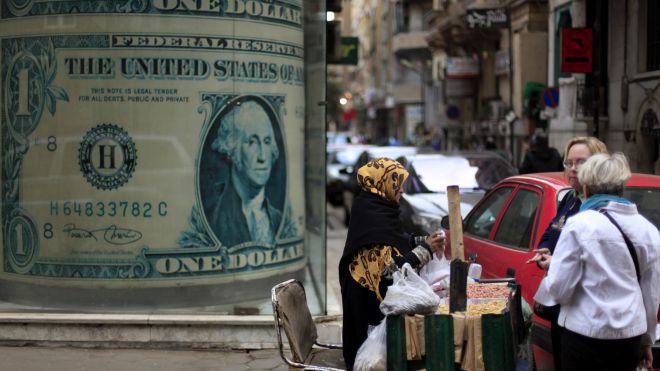
It is almost a truism that when a minister of finance or a central bank governor says that the currency will not be devalued, it is time to short the currency in question and bet on devaluation. By extension, the same holds when the country’s financial managers specify a floor for the exchange rate when the currency is falling.
In August 2012, the Egyptian Minister of Finance Momtaz Al-Saeed stated categorically that devaluation of the Egyptian pound was not going to be part of any agreement with the IMF, despite the precarious foreign exchange position of the country. Even though the Egyptian exchange rate system is defined as “managed floating” the currency has been more managed than floating, with the Central Bank of Egypt keeping the rate in a tight band of 1 percent around the US dollar.
At the end of December 2012, the Central Bank of Egypt moved to a more flexible system by starting daily foreign exchange auctions. The pound immediately began to slip, and despite administrative measures to control the demand for foreign currency, such as limiting the amounts that individuals and corporations could withdraw daily. The Egyptian pound today is 6.42 to the US dollar, a decline of over 3 percent in the last two days to its lowest level in eight years.
On January 2, 2013, the Finance Minister stated that “this surge in the dollar will never reach 7 pounds”. While the statement is designed to convey confidence to the markets, it can also send a signal to investors (and speculators) that the government has set a floor on how far it will allow the pound to fall. This may be viewed as an invitation to some investors to test the government’s resolve in holding the currency above 7 to the US dollar.
The fundamentals also point to continued weakness of the Egyptian pound in the near term and the Central Bank of Egypt will find it increasingly difficult to maintain currency stability. Foreign exchange reserves are being steadily depleted and now cover only 3 months of imports and are well below the threshold level of 20 percent of the money supply that investors view as safe.
Will the Egyptian pound fall to below 7 to the US dollar? Other than the level of foreign exchange reserves, investors typically look at two other simple indicators—inflation and interest rates. Inflation in Egypt is running at nearly 12 percent while the rate in the country’s trading partners is averaging less than 2 percent. Just to regain competitiveness, Egypt would have to let the pound depreciate by 10 percent. Furthermore, interest rates on Egyptian T-bills are around 13-14 percent while international interest rates on government paper of comparable maturities are in the 1-2 percent range. This means that investors are pricing currency risk of over 10 percent into Egyptian paper. On both accounts, therefore, the Egyptian pound is overvalued by at least 10 percent.
On fundamentals alone a continued weakening of the Egyptian pound in the near term is to be expected. A further depreciation of 10 percent from the current exchange rate would bring the rate very close to the 7 pounds/US dollar floor. However, this is not the whole story. Once the currency starts to depreciate the dynamics of where it will go are difficult to predict, and what economists and financial analysts call “overshooting” becomes a distinct possibility. In other words, as investors run for the exits the currency can fall dramatically, driven by expectations and not just fundamentals. In that event and in the absence of substantial external financing and policy actions, the government will not be able to defend the rate and the 7 pounds/US dollar level will be breached.
At this stage, almost everyone is pinning their hopes on an early IMF agreement. Talks are expected to begin again this month on the $4.8 billion loan that was postponed in December last year at the request of the Egyptian government. Hopefully, what the Minister Momtaz Al-Saeed was saying implicitly through his statement that the exchange rate will stabilize ”within a month” is that an IMF program will be adopted fairly soon, giving Egypt access to external financing from the IMF as well as from the European Union, donors, and other multilateral financial institutions, such as the World Bank and the African Development Bank.
The question is whether Egypt is ready to undertake the policy actions that were part of the original agreement with the IMF. One key policy action was increasing sales taxes on a number of consumer items, which the government felt was a political mistake in December. Is the Egyptian government ready to take such actions now? A number of analysts and foreign banks feel that politics will prevent them from doing so just yet and will probably only be possible after parliamentary elections in two months time. If the IMF program is delayed and other foreign financing does not materialize, the currency will certainly remain under significant pressure and could very well fall below 7 pounds/US dollar.
Mohsin Khan is a senior fellow at the Atlantic Council’s Rafik Hariri Center for the Middle East focusing on the economic dimensions of transition in the Middle East and North Africa.
Svetlana Milbert is assistant director of the Atlantic Council’s Rafik Hariri Center for the Middle East.
Photo: AP
Image: Egypt%20Pound.jpg
